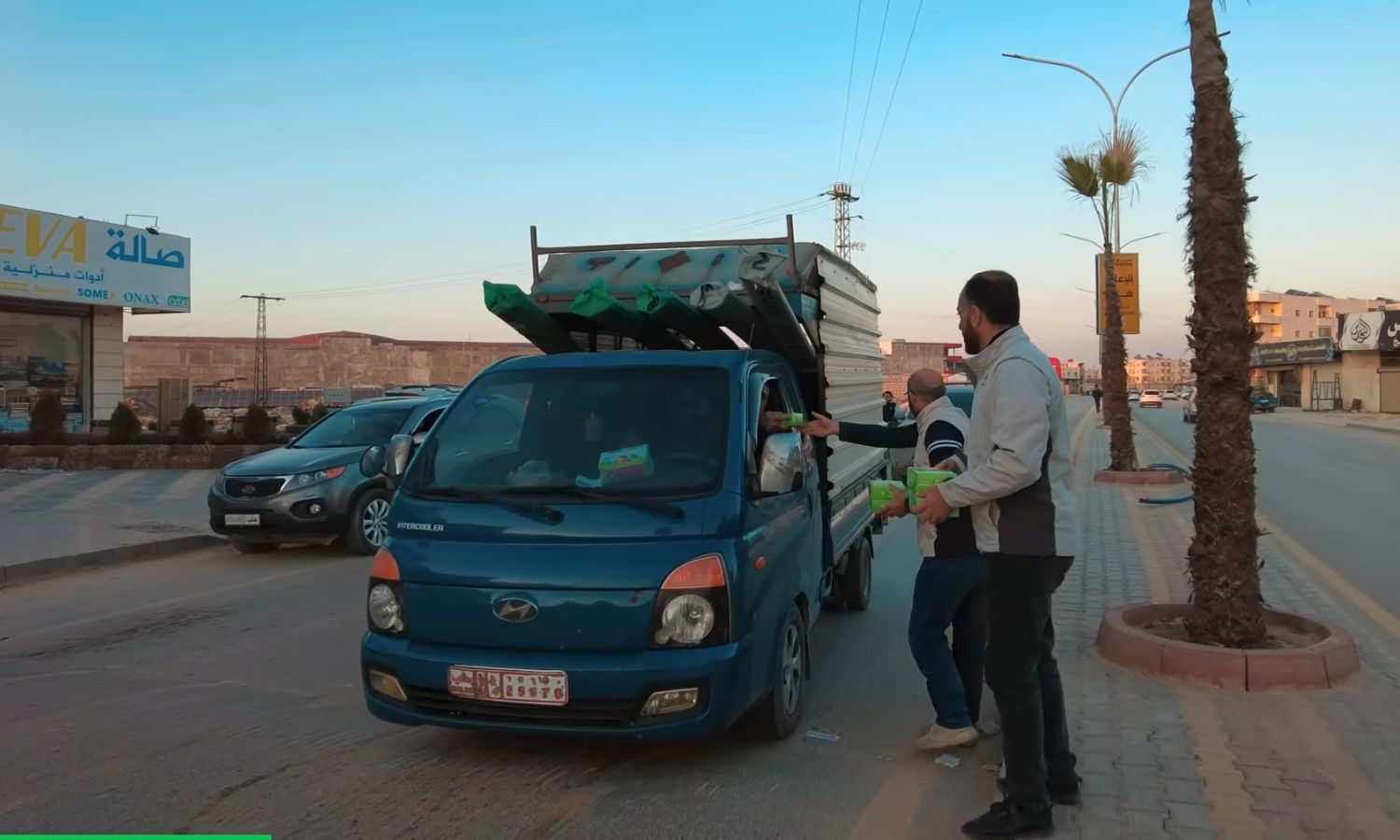



This year, the scenes of individuals standing with small bags containing a few dates and a bottle of water to distribute to travelers before the Maghrib call to prayer have declined on the streets of Idlib and the Bab al-Hawa highway.
Yasser al-Sayed (24 years old), a displaced person living in the city of Idlib, has been organizing initiatives to distribute iftar meals to travelers for five years. He told Enab Baladi that he began participating in these campaigns in his first year at the university when he met some friends and decided to launch the first initiative with them.
The initiative consisted of placing a small box of dates, a bottle of water, and a biscuit in a small bag and distributing them to travelers who pass by the Bab al-Hawa road at iftar time. Initially, it was not on a daily basis but according to the donations that al-Sayed’s team could collect.
Al-Sayed said that the initiative did not require a lot of money, as 50 US dollars per day were sufficient, and in the first year of the initiative, the team was able to collect an amount of $750 from relatives and friends outside Syria, and the following year they collected double the amount in donations. Some merchants also contributed by providing some crates of dates to the initiative.
According to al-Sayed, the team this year could only collect small amounts that barely suffice for two or three days of distribution. He pointed to the reason as a decline in donations and the weak financial situation of citizens, as well as Syrians abroad being occupied with securing aid for their families instead of donating to such initiatives, and the increase in prices added to the costs.
Despite the simplicity of these initiatives, they require high costs that are divided into two parts. The first is spent on the transportation expenses of those in charge of these initiatives, and the second is spent on buying foodstuffs such as dates and water, etc., which constitute a “simple” meal. The costs differ from one team to another, depending on the capabilities of those leading the initiative.
Mazen Obeid (36 years old), a displaced person from Damascus countryside living in Sarmada, organized an initiative to distribute iftar to travelers in 2023. He told Enab Baladi that he formed a volunteer team a few days before Ramadan in 2023 with the goal of doing some “good deeds,” including distributing iftar meals to travelers on the Bab al-Hawa highway.
He added that his team distributed more than 100 iftar meals each day, each containing seven dates, a small bottle of water, a banana, and a piece of maarouk bread at a cost of $0.7, plus $10 daily for transport expenses, making the cost of distributing 100 meals reach $80 per day. The total cost of the campaign did not exceed $2,500.
The general increase in prices increased the costs of such initiatives by between 60 and 70%, and the cost of a meal that was distributed in 2023 rose to more than $1.2. Therefore, the cost of distributing 100 meals exceeds $140 per day.
Thus, distributing 100 meals throughout Ramadan needs $4,200, which is a large amount that youth groups cannot afford without donations.
Salem al-Salem (41 years old) is one of the participants in an initiative to distribute iftar meals to travelers. He said that the volume of donations this year was weak, and he was able with his colleagues in 2023 to collect $3,500 to distribute them as simple meals for the iftar of travelers. As for this year, the donations have not reached half the amount.
Al-Salem added that this “simple” amount put the team in a dilemma between distributing only dates and water, which would make the amount last for more than half of Ramadan, or distributing 200 meals daily over only five days. The team eventually decided to buy a quantity of meat and distribute it to the poor and needy due to the high prices of meat and the inability of most families to buy the commodity.
Other reasons that led to the decline of initiatives to distribute iftar to travelers are the weather conditions and the drop in temperatures, which reduce citizens’ feelings of thirst and hardship from fasting, unlike previous years, and the rainfall hampers the standing of the youth on the roads.
The decrease in these initiatives does not mean their complete absence, as several teams and associations were active in them, including the “And Hope Remains Voluntary Team” and the “Ihsan Volunteering Team” and Ataa Association for Humanitarian Relief. Teams affiliated with them spread out on public roads before the Maghrib call to prayer and distributed simple iftar meals to passersby, in addition to the activities of dozens of organizations and volunteers in campaigns for Iftar Sa’im (Feeding the Fasting) in the camps, and distributing meals and food supplies to the needy.
In northwestern Syria, there are 4.5 million people, 4.1 million of whom are in need of assistance, and 3.3 million suffer from food insecurity. 2.9 million of them are internally displaced, and two million live in camps, according to the United Nations, while local statistics talk about 5.5 to 6 million people.
The daily wage of a worker reaches a maximum of 100 Turkish liras (about three US dollars), while the recognized poverty threshold is 10,843 Turkish liras, and the extreme poverty line is 8,933 liras.
if you think the article contain wrong information or you have additional details Send Correction